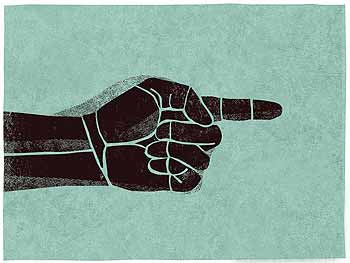 “When we point a finger at others, three fingers point back towards us. This means that before finding a fault with others, we should find three faults in ourselves.” – Radhanath Swami.
“When we point a finger at others, three fingers point back towards us. This means that before finding a fault with others, we should find three faults in ourselves.” – Radhanath Swami.
One young artist wanted to assess his skills. He put his best in painting a beautiful scenery and kept the painting at a busy street-crossing with the following message below it: “Since I’m new to this profession I might have committed some mistakes while painting; please put a cross wherever you see a mistake.”
When he returned after a few hours he was shocked to see crosses on all parts of his painting. Broken-hearted, he went to his teacher and wept about how people had rejected him completely. But the wise teacher consoled him and told him that actually his painting was flawless. He asked his pupil to paint the same scenery again. Again they kept the painting at the street-crossing. But this time, the message was different: “Since I’m new to this profession I might have committed some mistakes while painting. I have kept here a box with colors and brushes. Please do me a favor. If you see a mistake, kindly pick up the brush and correct it.” And guess what, no one made any corrections for the whole next month. It’s easy to find faults in others, but not so easy to help others improve.
Generally, when we associate with somebody for a long time, we start getting tired of him or her. Familiarity breeds contempt. That is human nature. The spouse starts getting on our nerves and we just start finding all sorts of faults. Quite often, our mind becomes occupied with minutely analyzing each fault in the other. But we should know that even we are full of faults, though we don’t want to admit it. Before finding a fault in the spouse, we should first find three within ourselves. If both spouses follow this rule, soon they will start appreciating how the other has accepted him or her with all the faults. In this mood, the spouses can cooperate and help each other diagnose faults in themselves and work together to cure them.
Any ordinary man can find faults with others, even if no fault exists. But it takes a great man to see the good in others, even if there’s only a little bit of it.

